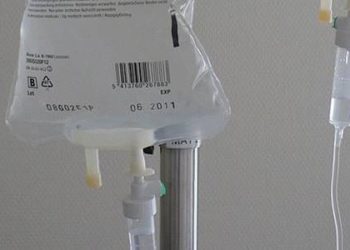Rituximab associated with lower drug discontinuation and disease relapse rates in multiple sclerosis
1. Rituximab was associated with lower discontinuation rates as compared to other disease-modifying treatments in newly diagnosed patients with relapsing-remitting multiple sclerosis.
2. There was a statistically significant decrease in disease relapse for those on rituximab as compared to injectable disease-modifying treatments.
Evidence Rating Level: 2 (Good)
Study Rundown: Disease-modifying treatments (DMTs) in multiple sclerosis (MS) include rituximab, interferon beta & glatiramer acetate referred to as injectable DMTs, fingolimod, natalizumab, and oral DMTs (dimethyl fumarate or teriflunomide). There is a paucity of studies comparing these DMTs in relapsing-remitting MS (RRMS). This retrospective cohort study aimed to assess the effectiveness and drug discontinuation rates of rituximab among patients with newly diagnosed RRMS as compared to injectable DMTs, dimethyl fumarate, fingolimod or natalizumab.
While there were pronounced regional preferences for medication initiated, rituximab was associated with lower annual discontinuation rates as compared to all other DMTs and was associated with statistically lower rates of clinical relapse or neuroradiologic disease activity as compared to injectable DMTs. There was a tendency for lower relapse rates with rituximab when compared to natalizumab, dimethyl fumarate and fingolimod. Limitations of this study included its nonrandomized design and no control for other factors that influence physician decision of initial therapy choice or threshold for switching therapy.
Click to read the study in JAMA Neurology
Relevant Reading: Ocrelizumab versus Interferon Beta-1a in Relapsing Multiple Sclerosis
In-Depth [retrospective cohort]: This retrospective cohort study examined prospectively collected data from a national MS registry that included individuals from hospitals from Stockholm and Västerbotten counties in Sweden. Patients were included into the registry if they were diagnosed with RRMS and starting their first DMT from January 2012 to October 2015. The exposures of interest were rituximab as compared to injectable DMTs, dimethyl fumarate, fingolimod or natalizumab. The primary outcomes of interest included rate of discontinuation of initial treatment choice (for all reasons) and then looking at specific reasons. Another outcome of interest was rates of clinical or neuroradiological disease relapse. Cox regression and propensity scores were used in statistical analysis.
There were 494 patients included in this study from both counties in Sweden. There were significant differences in therapy choice where 81% (42 of 52) of patients received rituximab for initial DMT in Västerbotten as compared to 18% (78 of 442) in Stockholm. Annual discontinuation rates were lower for those receiving rituximab as compared to all other DMTs: 0.03 for rituximab vs. 0.29-0.53 for the other DMTs. Reasons for discontinuation included continued disease (injectable DMTs, dimethyl fumarate and fingolimod) and positive John Cunningham virus serology for natalizumab. Relapse rates were significantly lower in the rituximab-treated group as compared to injectable DMTs (95% CI 1.6-11.2; p < 0.01). When adjusting for confounders there were statistical trends towards significance for the remaining DMTs: natalizumab 95% CI 1.0-17.2; p = 0.05, dimethyl fumarate 95% CI 1.0-11.8; p = 0.06 and fingolimod 95% CI 0.6-24.2; p = 0.15.
Image: CC/Wiki
©2018 2 Minute Medicine, Inc. All rights reserved. No works may be reproduced without expressed written consent from 2 Minute Medicine, Inc. Inquire about licensing here. No article should be construed as medical advice and is not intended as such by the authors or by 2 Minute Medicine, Inc.









